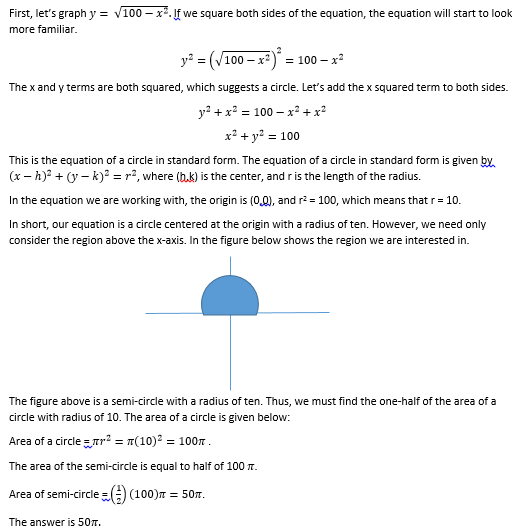Plane Geometry
Help Questions
ACT Math › Plane Geometry
The perimeter of a square is 48. What is the length of its diagonal?
Explanation
Perimeter = side * 4
48 = side * 4
Side = 12
We can break up the square into two equal right triangles. The diagonal of the sqaure is then the hypotenuse of these two triangles.
Therefore, we can use the Pythagorean Theorem to solve for the diagonal:
100_π_
50_π_
25_π_
10_π_
20_π_
Explanation
The area of a rectangle is 



Explanation
Based on the information given to you, you know that the area could be written as:
Likewise, you know that the perimeter is:
Now, isolate one of the values. For example, based on the second equation, you know:
Dividing everything by 
Now, substitute this into the first equation:
To solve for 
or:
Now, factor this:




You could also get this answer by testing each of your options to see which one works for both the perimeter and the area.
Find the total number of degrees inside a hexagon.
Explanation
To solve, simply use the following formula where 
Find the perimeter of an equilateral triangle given side length of 2.
Explanation
To solve, simply multiply the side length by 3 since they are all equal. Thus,
Find the length of one side for a regular hexon with a perimeter of 
Explanation
Use the formula for perimeter to solve for the side length:
The long diagonal of a kite measures 

Explanation
The long diagonal of a kite always bisects the short diagonal. Therefore, if one side of the bisected diagonal is 

The long diagonal of a kite measures 

Explanation
The long diagonal of a kite always bisects the short diagonal. Therefore, if one side of the bisected diagonal is 

Given the following isosceles triangle:

In degrees, find the measure of the sum of 


Explanation
All quadrilaterals' interior angles sum to 360°. In isosceles trapezoids, the two top angles are equal to each other.
Similarly, the two bottom angles are equal to each other as well.
Therefore, to find the sum of the two bottom angles, we subtract the measures of the top two angles from 360:
A circle has an area of 
Explanation
To find the circumference of a circle we use the formula

In order to solve we must use the given area to find the radius. Area of a circle has a formula of

So we manipulate that formula to solve for the radius.

Then we plug in our given area.

Now we plug our radius into the circumference equation to get the final answer.

























































